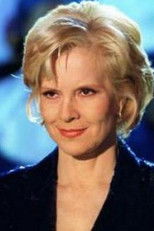Sylvie Vartan
- Teen actor
Sylvie Vartan (born Sylvie Georges Vartanian; 15 August 1944) is a Armenian-Bulgarian-French singer and actress. She is known as one of the most productive and tough-sounding yé-yé artists. Her performances often featured elaborate show-dance choreography, and she made many appearances on French and Italian TV. With 50 million records and CD's sold worldwide, 2000 magazine covers (number one French female artist before Bardot and Deneuve) and being the number one French female singer with concerts and audience worldwide, Sylvie Vartan is considered a true Legend and icon.
Yearly shows with then-husband Johnny Hallyday attracted full houses at the Olympia and the Palais des congrès de Paris throughout the 1960s and mid-1970s. In 2004, after a break in performances, she began recording and giving concerts of jazz ballads in francophone countries.
Sylvie Vartan was born in Iskrets, Sofia Province, in the then Kingdom of Bulgaria. Her father, Georges Vartanian (1912—1970), was born in France to a Bulgarian mother named Slavka and an Armenian father. He worked as an attaché at the French embassy in Sofia. The family shortened the name Vartanian to Vartan. Her mother, Ilona (née Mayer 1914–2007), daughter of prominent architect Rudolf Mayer, was of Hungarian-Jewish descent.
When the Soviet Army invaded Bulgaria in September 1944, the Vartanian family house was nationalised and they moved to Sofia. In 1952, a friend of Sylvie's father, film director Dako Dakovski, offered her the role of a schoolgirl in the movie Pod igoto, a film about Bulgarian rebels against the Ottoman occupation. Participating in the film made her dream of becoming an entertainer come true.
The hardships of postwar Bulgaria made the family emigrate to Paris in December 1952. At first they stayed in the Lion d'Argent hotel near Les Halles, where Georges found a job, then for the next four years they stayed in a single room at the Angleterre Hotel. Young Sylvie had to work hard to keep up at school and blend in with her schoolmates. She spent two years learning French.
In 1960, her family moved to an apartment in Michel Bizot Avenue. Thanks to the influence of her music producer brother Eddie, music became teenage Sylvie's main interest. Her most influential genres were jazz and, out of spite toward her strict high school, rock 'n' roll. Her favourite artists included Brenda Lee, Bill Haley, and Elvis Presley.
In 1961, Eddie offered Sylvie the chance to record the song "Panne d'essence" with French rocker Frankie Jordan. The Decca Records EP was a surprise hit. Although she was not credited on the sleeve, "Panne d'essence" provided Vartan her first appearance on French television. The journalists gave her the nickname la collégienne du twist. After the "twisting schoolgirl" had finished the Victor Hugo High School, she was free to sign a contract with Decca Records to start recording her own EP; carrying the title song "Quand le film est triste", a cover of Sue Thompson's "Sad Movies (Make Me Cry)", the EP was on sale by the beginning of December 1961. ...
Source: Article "Sylvie Vartan" from Wikipedia in English, licensed under CC-BY-SA 3.0.
Acted in
My Mom, God and Sylvie Vartan
2025
as Self
Unknown Beauty: François Nars
2023
L'Âge d'or de la pub
2023
as Self (archive footage)
Sheila, toutes ces vies-là
2022
as Self (archive footage)
Il était une fois Champs-Élysées
2022
as Self (archive footage)
La TV des 70's : Quand Giscard était président
2022
as Self (archive footage)
Sylvie Vartan : le récital
2021
Michel Sardou une vie en chantant
2021
as Self
Archives secrètes
2021
as Self (archive footage)
La Boîte à secrets
2019
as Self
The secret song
2018
as Self
Roger Kasparian, l'oeil des 60's
2014
as Self
It Happened in Saint-Tropez
2013
as Une people à Cannes soirée Melko
L'Amour, la mort, les fringues
2011
Johnny Hallyday : Tour 66 - Stade de France
2009
as Self
L’ange et la femme: le cinéma de Jean-Claude Brisseau
2008
as Self
Rare and Unseen: The Beatles
2008
as Self
Mausolée pour une garce
2001
as Agnès Taride
Star Academy
2001
as Self
The Black Angel
1994
as Stéphane Feuvrier
Johnny Hallyday : Parc des Princes 93
1993
as Self
Stars 90
1990
as Self
Miss France
1986
as Self - Judge
Victoires de la musique
1985
as Self
Die verflixte 7
1984
as Self
Sunset People
1984
Sylvie Vartan: Live in Las Vegas
1982
The Big Show
1980
as Self
Carlos Numéro 1
1979
as Self
30 millions d'amis
1976
as Self
Numéro un
1975
as Self
Numéro un
1975
as Self - Host
Numéro un
1975
as Self (archive footage)
Système 2
1975
as Self
Midi Première
1975
as Self
Klimbim
1973
as Self
Repeated Absences
1972
as Une femme à la soirée mondaine
J'ai tout donné
1972
Midi trente
1972
as Self
Le Grand Échiquier
1972
as Self
Cadet Rousselle
1971
as Self
Baden-Badener Roulette
1971
as Self
Malpertuis
1971
as Bets
À bout portant
1968
as Self
The Ponies
1967
as Sylvie Vartan
Europarty
1967
as Self
Dim Dam Dom
1965
as Self
Friends of the family
1964
as Alexa Rollo
Cherchez l'idole
1964
as Sylvie Vartan
Where Are You From, Johnny?
1963
as Gigi
Just for Fun
1963
as Self
Un clair de Lune à Maubeuge
1962
as La chanteuse yéyé










































